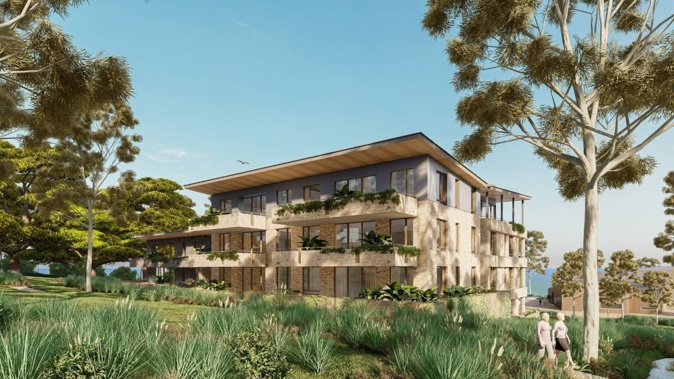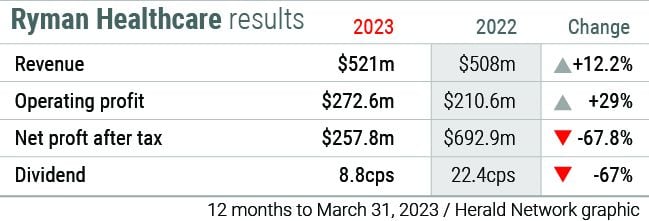

Rising expenses and less spectacular property revaluations hit profit from New Zealand’s biggest listed retirement village company, down 63 per cent annually, although underlying profit rose 18.4 per cent.
Ryman Healthcare made $275.8m for the full year to March 31, 2023, down on the previous $692.9m for the March 31, 2022 year.
Revenue rose 12 per cent from $508.8m to $571m but operating expenses were also up from $466.2m to $533.3m, eating into the bottom-line figure.
Unrealised revaluations fell 84 per cent from $467.1m last year to $73.7m in the latest year.
Operating expenses rose 14.4 per cent reflecting new villages and one-off costs related to inventory and holiday pay provisions, the company said of that figure.
For the year ahead to March 31, 2024, the company has forecast underlying profit to be in the $310-$330m range, in line with the statement provided at the time of its $902.4m equity raise in March.
Total assets of $12.51b are up 14.1 per cent annually.
Booked sales of occupation right agreements held steady, “with growth in resales offsetting softer new sales. Total booked sales of occupation rights increased from $1.08b to $1.17b, driven by a 10.3 per cent uplift in average price per unit”.
In February, the Herald reported how Ryman surrendered to its $3b net debt position and asked shareholders to help repay almost one third of it. Capital raises at the scale of Ryman’s $902 million offer are uncommon.
Last May, Ryman’s profit shot up 64 per cent after big revaluation gains and the business announced $205m plans for Rolleston and a new $350m Melbourne village.
But the bottom line figure included unrealised investment property revaluations which more than doubled from $201.2m last year to $467.1m in the latest year.
New Zealand operations made $589.6m of that net reported profit after tax and Australia $103.2m and one institutional investor said this morning the result was far stronger than the market had expected.
The sector is under pressure, with the Commerce Commission saying this month it started an investigation into the multi-billion dollar retirement village industry at the same time as a ministry has the sector under the spotlight for its practices.
The commission confirmed its involvement after long-standing complaints from the Retirement Village Residents Association, Consumer NZ and others.
And it’s not the only arm of the state with the sector in its sights.
Te Tūāpapa Kura Kāinga The Ministry of Housing and Urban Development also has an investigation on after widespread calls for change from Consumer NZ, the Retirement Commissioner, the association and residents.
Brian Peat, Retirement Village Residents Association president, said this month: “We’re simply asking for fairness and consumer protection. We, along with Consumer NZ, believe some clauses are not fair - and will not stand up to scrutiny.”
Analysts are now looking how more Government regulation could change the sector. Arrie Dekker, Jarden managing director and research head, put out a note this month, written in collaboration with colleague Vishat Bhula.
There was potential for changes from the reviews that could affect business models and require adjustments, they said.
Ryman Healthcare, Summerset, Oceania Healthcare and Arvida Group were listed as stocks in the sector.
The sector and its growth were a testament to the quality of service and experience provided to residents and indicative of a sector operating without systemic issues, they said.
On potential implications, compulsory buyback and capital gains sharing could be affected.
Buyback timeframes had been a systemic issue and changing this could “test” some smaller private operators, the note said.
Forcing owners to share capital gains with residents would be a big change.
Not doing this had been “a key source of cash flow for the sector over the late decade,” the note said. So owners might seek to be compensated for losing that with charging higher fees.
Overall, a legal review could spell big change.
“It would be remiss to ignore the potential for change out of these reviews, with the sector needing to take a balanced approach in its response,” the note warned.
Ryman has a market capitalisation of $3.8m.
Shares have been trading around $5.40 lately, down from $14.88 in September 2021.
Take your Radio, Podcasts and Music with you









